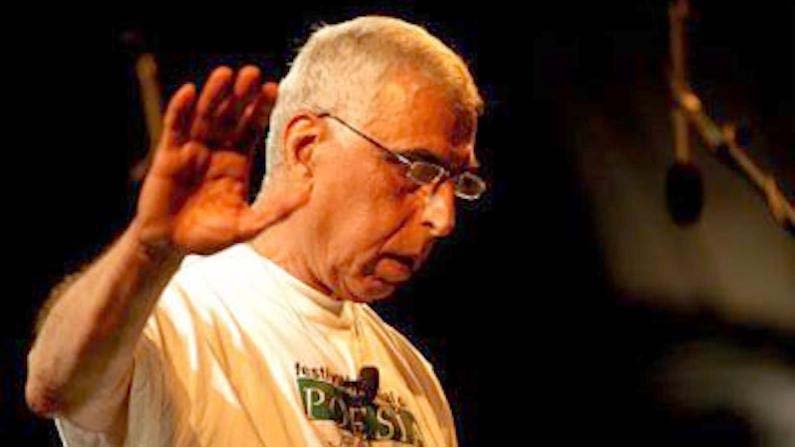A web-based image of Saadi Youssef.
The legendary and controversial Iraqi poet Saadi Youssef died at 87 in his Harefield home outside of London on June 12 from lung cancer. The poet, whose multitude of works encompassed poetry, prose, literary criticism, translation, and memoir, leaves decades’ worth of work penned in exile and translated into several languages, among them English, French, German, and Italian. Publishing over 40 collections of poetry, a volume of short stories, two novels, and several essays, Youssef was one of the Arab world’s most important poets. He came from a generation of Iraqi and Arab poets who emerged during the middle of the last century. Youssef earned several awards including the Italian International Prize for best foreign author in 2005.
Born in the village of Abu al-Khasib in Basra, Iraq in 1934, Youssef dedicated most of his life to writing. He graduated with a B.A. in Arabic Literature from the Teachers’ College of Baghdad in 1954 and subsequently worked as a teacher and later in literary journalism. In his youth he joined the Iraqi Communist Party, an affiliation that led to his frequent imprisonment. He attended a youth forum in Moscow in the mid-1950s, and because of his connections to the Iraqi Communist party, his return to Iraq became dangerous, pushing him to choose exile in Kuwait where he stayed for two years. Youssef returned to Iraq after the 1958 revolution that overthrew the Hashemite monarchy, but was imprisoned under the Baathist regime in 1963 and released a year later. He went into exile again in Algeria in 1964, where he taught for several years, and returned to Iraq in 1970, remaining until Saddam Hussein came into power in 1979. From then on, he lived in constant motion, moving to Damascus, Beirut, Cyprus, Yemen, Tunisia, Paris, and Amman, before finally settling in London in 1999. Here, Youssef spent the rest of his life in a retirement community in Harefield. He remained a socialist for his entire life, describing himself as “the last communist” (also the title of a poetry collection he published in 2007), yet disavowing the Iraqi Communist Party because of its support of the 2003 U.S. invasion, according to Evelyn Lau in the National.
His numerous poetry collections include “Visible Poems” (1969) and “The Trees of Ithaca” (1992), among several others. Youssef was also a prolific translator, translating works of prominent poets like Walt Whitman and Federico Garcia-Lorca, and novels by George Orwell into Arabic.
Youssef’s poetic style was marked by his command over complex details, graceful, concise language, and youthful language. He did not rely heavily on excessive rhetoric, and his works were original, not borrowing from others. The most prominent features of his style appeared by the end of the 1960s, distinguished by the unexaggerated accuracy of his images, his transparent meanings, and the way he avoided ideology. Youssef wrote almost daily, evident by the dates of his poems, and his poems began from an event or daily detail he observed, according to Mohammed Houjeiri from Al Modon.
The prominent Palestinian poet Mahmoud Darwish once lauded Saadi Youssef as the most important Arab poet. According to poet Abbas Beydoun, Darwish’s praise was thought-provoking and not said haphazardly or to flatter. Arguably one of Youssef’s most important books, “Visible Poems” earned him respectable renown within the Arab poetic world. Of course, others questioned Darwish’s statement. In the words of Mohammed Houjeiri, “His (Darwish) words are not without impact, but there is some exaggeration in it, according to those who knew Youssef. He is one of the most prominent and one of the most important, but not the most important poet.”
Contrary to the delicate style of his writings, Youssef’s approach and severe expressions towards others earned him criticism and controversy. In fact, in 2014, the Ministry of Education of the Kurdistan Regional Government removed his poetry and the translation of his life story from the curriculum after he described Kurds as monkeys and Kurdistan as Qurdistan (city of monkeys). Youssef was also known for his harsh attitude towards public figures, cultural institutions, and political authorities, publishing offensive material as he pleased. In 2004, he was awarded the Al Owais prize for poetry. However, the award was later retracted after he published an offensive poem about the founder of the prize. Neither did he refrain from criticizing the works of his peers. Youssef suggested the works of eminent Arab poets Nazik al-Mala’ika and Abdul-Wahhab al-Bayati held no artistic value.
Youssef is survived by his two daughters, Mariam and Shiraz, and his wife Iqbal Kadom. He will be buried at Highgate Cemetery with no mourners, at his request in his will.
Al Jadid previously published an article on Saadi Youssef, “America, the Gulf War, and Arabic Poetry” by Salih J. Altoma and a translation of his poem, “America America,” also by Salih J. Altoma, which appeared in Al Jadid, Vol. 3, No. 21, Fall 1997. Other translated poems can be found in the links below:
Copyright © 2021 AL JADID MAGAZINE

